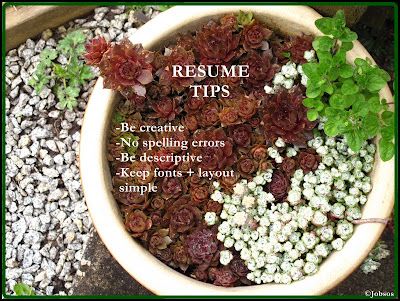A basic resume should include the following headings:
Highlights of Qualifications or Summary of Skills/Experience
Highlights of Qualifications or Summary of Skills/Experience
In this section you will include your highlighted skills using a bulleted list. Keep this section short and to the point. You want to draw the reader of your resume in with this section and keep their attention.
Relevant Skills/Experience (optional)
This section is optional – it should be placed under your “Highlights of Qualifications” section. This section is beneficial if you have more than one skill set ie: Customer Service and Clerical backgrounds. You can use this section to more specifically define your skill set and capture the reader’s attention to the skills you have.
Employment Background or Work History
This section is mandatory – add your work experience in chronological order starting from your most recent work experience. Include the position, company name, city, province/state and the dates that you worked for that company. If you have a variety of work experience that is not all in the same industry, you may include a couple of skills statements (bulleted) underneath each job to highlight your skills. If your work history primarily includes the same industry/job, you will want to include your skills statements for the skills/experience that you have in the Summary section at the beginning of your resume.
Education/Professional Development/Training
Include your educational background in chronological order starting from your most recent experience. You do not have to include your highschool information unless the job posting is specifically asking for this. Include any professional development you have completed (ie: workshops to enhance your knowledge of your industry, certificates that you have gained while on the job, etc). Include short-term training. This section does not necessary needs dates of completion; but remember that you should not include any training that you have not completed or has expired. If you have partially completed a post-secondary course, you can add this and use a bulleted list underneath the Course Name, School that shows which courses you have completed.
Volunteer Experience & Affiliations
If you have volunteer experience and it relates to the job your applying for, then definitely add it! If you have gaps in your work history but spent time volunteering, also add this information. Also add any associations/affiliations that you are connected to (if it is relevant)
Hobbies and Interests
There is always a question as to whether or not you should include this information on your resume; however, if your hobbies and interests are relevant to the industry that you are job searching in, then include this information as it may be the one of the ways that your resume stands out to an Employer.
It is important to note that headings can always be changed. Try various formats and see what works best for you. Also, research examples of resumes in your industry to get ideas.
Remember, a resume is a work in progress. A resume is also a reflection of YOU and Your skills. Spend the time working on it so that it catches the employer's attention. In many cases, the resume is the tool that secures the interview. And the interview is where you see the light at the end of the job search tunnel!
-Sunny + Sassy
It is important to note that headings can always be changed. Try various formats and see what works best for you. Also, research examples of resumes in your industry to get ideas.
Remember, a resume is a work in progress. A resume is also a reflection of YOU and Your skills. Spend the time working on it so that it catches the employer's attention. In many cases, the resume is the tool that secures the interview. And the interview is where you see the light at the end of the job search tunnel!
-Sunny + Sassy
















